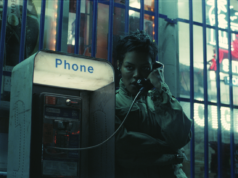Wish I could say I took the day off to sleep and decompress, but instead I went and caught up with my other duties at the Weekly. Nevertheless, I do feel refreshed and ready to take in the semifinal round, which features all the pianists playing Christopher Theofanidis’ work commissioned for the competition, Birichino. (The title means “rascal” or “pickle” in Italian.) Along with fewer performances to critique, it also offers chamber music and the chance to hear instruments other than the piano. Of the four piano quintets being offered to the contestants to play, four of the pianists are playing Schumann and Dvořák apiece, three are playing Brahms, and one is playing Franck. That’s generally how it goes. (More on the Franck further down.) I’ve long advocated expanding the piano quintet repertoire to include Shostakovich’s quintet. Some of these Russian players would undoubtedly be more comfortable playing it, and having the string quartet prepare five quintets instead of four doesn’t seem like an onerous burden, especially when they have a couple of years to do it. (At least that’s how it seems to me. If any chamber musicians want to correct me, feel free.) Plus, Shostakovich’s Piano Quintet is a lot of fun, which is a compelling reason all on its own.
Huangci came out in a shimmering purple dress and won a round of applause before she even started by removing the music stand from the piano before playing Birichino. Was she signaling to the audience that she had the new piece memorized and therefore didn’t need the stand, or did she simply not want it there when it wasn’t serving any purpose? I followed along with the score, which the Cliburn staff graciously printed out for me. She gave a professional reading of the piece. I can’t render further judgment at this point because I’m still coming to grips with the new work myself. No matter, I’ll have 11 more performances to get familiar with it. She followed it with Beethoven’s “Les Adieux” Sonata, and while she did particularly well with the finale, I don’t find this pianist at her best in Beethoven. Next came a strong, cohesive performance of Schumann’s Symphonic Études, played with a lemony astringency that I liked. She ended her recital with a piece I wasn’t familiar with, Prokofiev’s Romeo and Juliet Before Parting, a selection from the composer’s piano transcription of his own ballet. Clearly Huangci loves this piece, and she delivered an impassioned and beautiful performance of it. Sweet sorrow, indeed.
The Brentano String Quartet made its first appearance dressed all in black, and Rana came out in a black pantsuit with a white panel on the left side of the top, a way to match the quartet’s outfits while staying distinct from them. The Schumann Piano Quintet seemed like a natural fit for her, and so it proved, as she gave a terrific performance of this piece that never fails to impress me with its ingenuity. The quartet seemed to have too much adrenaline at the very beginning, but it seemed that Rana coolly pulled them back into her orbit. (Either that, or the string players calmed down on their own.) Their vibrant rendition got the chamber music portion of the competition off to a flying start.
Mndoyants programmed a semifinal recital designed to prove his skill in miniatures. It worked like clockwork for a while. He started with three Scarlatti sonatas, giving each one its own character, drawing the pathos out of the B minor one (L. 33) and spring to the happy one in G major (L. 487). After his performance of the Birichino, he played three Debussy preludes, bringing a glorious sound to “La cathédrale engloutie” (“The sunken cathedral”) and great abandon to “Feux d’artifice” (“Fireworks”). I’m not sure what happened when he got to Mussorgsky’s Pictures at an Exhibition, however. He did some eccentric but convincing things with “Gnomus” and brought the appropriate rawness to “Baba Yaga,” but overall the set was too plain for me. This was the least strong of all his performances in this competition.
Abrosimov seemed tentative and ill at ease with the Dvořák Piano Quintet, whether it was with the demands of chamber music or with the music itself. You could hear him pulling back, trying not to play too loud and overwhelm the string players. The second movement came off particularly stilted. Of course, given the short preparation time these pianists have to rehearse with the strings, I don’t feel inclined to hold a subpar chamber music performance against a contestant. Then again, I might feel differently if I paid for my ticket.
Sakata started off with the Birichino, which is a quick piece filled with clusters of notes, runs, and weird rhythms and meters. Seriously, it switches between 2/4, 3/4, 4/4, 5/4, 3/8, and 6/8, sometimes multiple times within a few measures. (Someone has been studying their math rock.) Unlike the two pianists who preceded him with this piece, Sakata needed the sheet music in front of him. He did all right with it, though Mndoyants seemed to understand it better. The Japanese pianist followed the new work with Book I of Debussy’s Études, which (unlike most of Debussy’s music) is abstract music that’s not intended to evoke an image or a place. A brave choice, especially since the pieces aren’t as dramatic as a set of Chopin études. The native of Nagoya did himself credit with a crisply executed Étude 2 for thirds. He took the splashy Étude 5 for octaves too fast, but he made up for it with a jaw-dropping Étude 6 for eight fingers. He ended with Rachmaninov’s 1931 revision of his B-flat minor Sonata, playing it dryly and directly, without the plummy Russian sound that we’re used to hearing in this work. It was rather startling to hear Rachmaninov played this way, but it generally worked well. The healing second movement with its somewhat crazed climax came out especially beautifully in Sakata’s rendition.
Kholodenko was the one pianist playing the Franck Quintet. No wonder; only three pianists out of the 30 in the Cliburn field chose that work. It’s a great piece of music, but the pianist doesn’t have much to do except play menacing chords while the strings get the rewardingly angsty material. Then again, it’s a good pick for a soloist who’s unused to being part of an ensemble, because it doesn’t matter if the piano occasionally swamps the strings. Anyway, the Brentanos seized the moment and played well. As for Kholodenko, he showed little feel for the French composer’s style and was generally uninteresting in the parts that highlighted the piano. Yet when the quartet was in full rip, he was happy to contribute to the general welter of sound.












